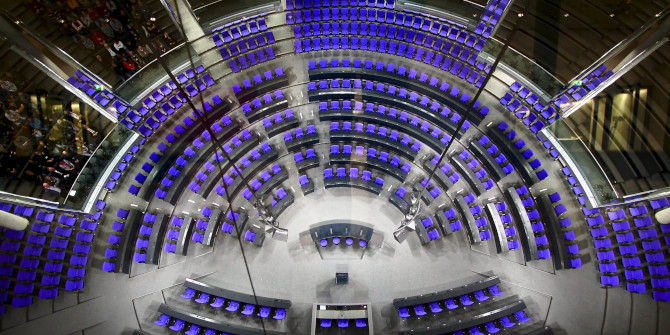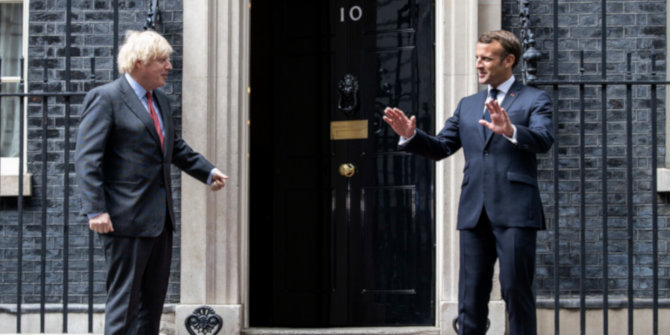Disproportionate numbers of politicians within national parliaments are male, affluent and belonging to the ‘native’ majority of their country. But while the composition of a parliament may not reflect the composition of society, does this affect the representation of citizens’ views? Drawing on new research in Germany, Lea Elsässer, Svenja Hense and Armin Schäfer demonstrate that the views of particular groups are consistently underrepresented in policymaking, with much of this effect likely to stem from the social background of MPs.
Parliaments of western representative democracies have never been a mirror image of society. Legislators are disproportionately male, affluent, and belonging to the ‘native’ majority of a country. But while women and some ethnic and racial minorities have made inroads into politics during the last decades – even though their share is still far from being proportional – the opposite is true for people from lower-status social classes or with low levels of formal education. All over Europe, university graduate and professionals disproportionately fill the ranks of parliaments. At the same time, citizens with fewer resources increasingly abstain from voting and other forms of political participation, thus marginalising their voice in the political process even further. This unequal parliamentary representation translates into political decisions that favour ‘better-off’ groups.
In recent years, different scholars have demonstrated that political decisions are biased in favour of the better-off. In the US context, researchers have argued that the main explanation for this finding is the dominance of private money in elections: anyone running for office depends on large private donors to finance the campaign and, thus, cannot afford to alienate them when in office. Most European parties finance their campaigns through a mix of state subsidies, ordinary membership contributions and private donations. Even there, however, the affluent are much more likely than the poor to see their demands translated into policies. The dependency on private donors hence cannot fully explain why similar patterns of representational inequality appear in otherwise distinct setups.
To shed light on the puzzle of unequal representation in egalitarian countries, we compiled a dataset that contains survey questions on a broad variety of political issues in Germany. Each survey question asks if respondents favour or oppose a specific reform proposal. We cover the period from 1980 to 2013, which allows us to analyse three decades of policymaking with different governments in office. For 746 questions, we calculated the degree of support for different occupations and levels of education. In addition, we added information on whether or not the proposed policy change was enacted in the four subsequent years after the survey. Combining these sets of information makes it possible to analyse whose preferences are turned into policies.

German Bundestag, Credit: ERAKU (CC BY-NC 2.0)
A number of findings are worth noting. First, the greater the social distance between social groups, the larger the disagreement over policy reforms is. This is in line with research showing that labour market experiences and individual resources shape one’s own political preferences and views. Second, in Germany, too, policy responsiveness is unequal – meaning that policymakers respond more strongly to the demands of the better off than to the preferences of the less privileged. For example, if more business owners, civil servants or higher-grade employees favour policy change, it is more likely to happen. In contrast, whether few or many workers or lower-grade employees support change, does not make reforms more or less likely. Third, this pattern of unequal responsiveness is even more pronounced when different social groups disagree. When less privileged citizens want something distinct from the wishes of better-off groups, they hardly ever get what they want. In this case, political decisions almost exclusively reflect the preferences of well-endowed groups.
So, what explains these patterns of unequal responsiveness? One factor could be party differences. Assuming that leftist parties cater more strongly to the interests of workers, one might think that liberal or centre-right parties dominated governments during the years we studied. However, even though the Christian Democrats were the leading government party for most of the time between 1980 and 2013, a party effect does not seem to be at work here. In fact, we did not find that the centre-left government in office between 1998 and 2005 was any more responsive towards workers than the Grand Coalition or the governments of Christian Democrats and Liberals under Helmut Kohl or Angela Merkel. Governments change but inequality stays.
We also looked for differences between economic issues (or differences related to the traditional conflicts between ‘left’ and ‘right’ policies that are mainly about distribution or social and labour policies) on the one hand and cultural issues on the other hand. One might assume that conflicts about cultural issues have become more important over time and workers, on average, tend to be more conservative in this regard. As societies grow more culturally liberal, workers get their way less often. However, our research does not corroborate this idea: opinion differences are still larger on distributive issues but political decisions are equally biased in both dimensions.
If it is neither parties nor issues, then what explains unequal representation? We maintain that the social background of MPs matters. Since professionals, lawyers, teachers, and business owners govern, parliament’s decisions tend to reflect the preference of these groups. While only 5 per cent of the German population were civil servants in 2011, 18.5 per cent of German MPs used to be civil servants. Business owners and the self-employed were also clearly overrepresented (11 vs 29 per cent). More than four out of five parliamentarians attended university but only 20 percent of the German population had done so. In contrast, about a quarter of the population (over the entire period) were workers, but workers were all but absent from parliament. Among all the university graduates, there were very few construction workers, office clerks, nurses or nursery school teachers. In parliament, some voices are just not heard equally well.
For more information, see the authors’ accompanying paper in the Journal of European Public Policy
Note: This article gives the views of the authors, not the position of EUROPP – European Politics and Policy or the London School of Economics. Featured image credit: ERAKU (CC BY-NC 2.0)





